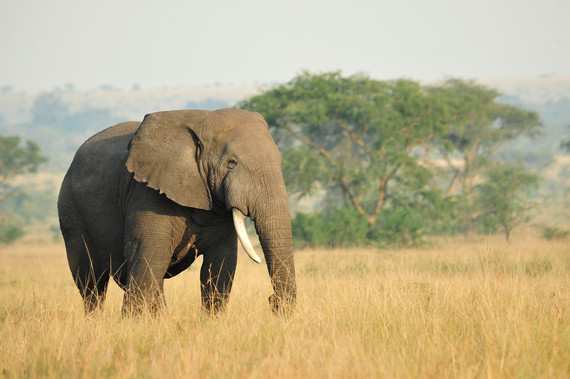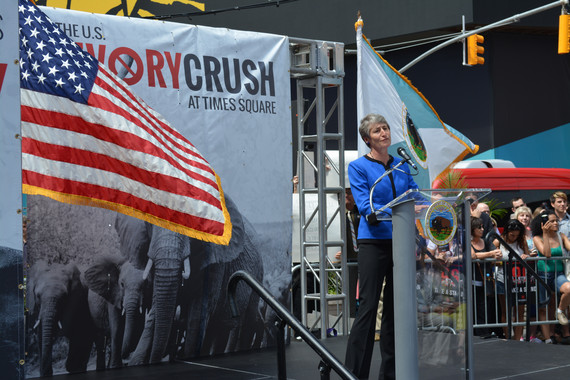It has been a long time since Congressional appropriations, the process by which government funding is determined for the next fiscal year, has gone exactly according to plan.
Normally, the President will submit a budget request for what he believes national spending should reflect in January or February. Then, using (or completely disregarding) that framework, the House and Senate appropriators will begin hammering out details of where our tax dollars will go. It is a long, contentious process - sometimes, so much so that Congress essentially gives up on consensus and just extends the funding levels from the last year.
Remarkably, a few priorities have broken through the partisan gridlock as things that appropriators from both parties agree that the U.S. budget should support. For the past few years, wildlife trafficking has been one of those priorities.

More than a ton of elephant ivory is crushed in New York's Times Square in June 2015. The global ivory trade is currently responsible for the brutal slaughter of as many as 35,000 elephants a year in Africa. Photo by Drew Albinson ©WCS
That's why we need to keep pressure on our elected officials to continue the fight against wildlife trafficking. Though it wasn't emphasized in President Obama's proposed FY17 budget, Congress has the opportunity to maintain its longstanding support for these essential programs.
Wildlife trafficking is something that people of all political stripes can agree on because in many ways it is a national security issue. The people who are trading illegal wildlife products like elephant ivory, rhino horns, shark fins and tiger skins are members of intricate criminal networks. Many of these syndicates are the same ones engaged in the illegal trafficking of weapons, drugs, and even people. Stopping wildlife trafficking is a way to shut down the networks that engage in other forms of crime.
Endangered wildlife are often poached from places that suffer from poor governance, a lack of law enforcement resources, and corruption. When countries like the U.S. commit funds to protect wildlife on the ground, we are supporting the rule of law and stability in those countries. That makes those places less likely to collapse into a breeding ground for more extremist groups, which threaten U.S. global interests.

An elephant in the wild. Stopping the trafficking of illegal wildlife and wildlife products is essential to conserving endangered species such as elephants, tigers, marine turtles, pangolins, and many others. Photo by Julie Larsen Maher ©WCS
These ideas have brought the Congress together around the issue of wildlife trafficking. Three years ago, appropriators created a new fund, administered jointly by the U.S. Agency for International Development (USAID) and the State Department's Bureau of International Narcotics and Law Enforcement Affairs, dedicated solely to tackling wildlife trafficking. That money goes directly toward supporting wildlife rangers, on-the-ground law enforcement, addressing demand for wildlife products; the fund began at $45 million in FY14, and Congress has supported it every year since then, culminating in $80 million in Speaker Paul Ryan's FY16 budget agreement last fall. That agreement also saw record support for the USAID Biodiversity Program and the Global Environment Facility (GEF), as well as other anti-trafficking programs.
President Obama's FY17 budget request contained some very good environmental provisions, but it was missing support for the fight against wildlife trafficking. The dedicated wildlife trafficking account was proposed at $41 million, a little more than half of what Congressional Republicans and Democrats agreed upon just last fall. The USAID Biodiversity Program and the GEF also saw reduced proposals.

U.S. Secretary of the Interior Sally Jewell was on hand to witness the symbolic crushing of raw and carved ivory tusks and statues by an industrial rock crusher during the Times Square Ivory Crush in June 2015. Photo by Madeleine Thompson ©WCS
The Obama Administration has been a strong voice for wildlife conservation, having put forward a National Strategy on Wildlife Trafficking and leading the charge for a strong federal ivory ban. But as the Congress now considers the future of federal spending, we look to members of both parties to continue that legacy of bipartisanship and support the anti-trafficking programs that enhance our security and help protect our iconic wildlife from criminal networks.
